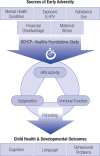Healthy Foundations Study: a randomised controlled trial to evaluate biological embedding of early-life experiences
- PMID: 29374668
- PMCID: PMC5829768
- DOI: 10.1136/bmjopen-2017-018915
Healthy Foundations Study: a randomised controlled trial to evaluate biological embedding of early-life experiences
Abstract
Introduction: Adverse early experiences are associated with long-lasting disruptions in physiology, development and health. These experiences may be 'biologically embedded' into molecular and genomic systems that determine later expressions of vulnerability. Most studies to date have not examined whether preventive interventions can potentially reverse biological embedding. The Nurse-Family Partnership (NFP) is an evidence-based intervention with demonstrated efficacy in improving prenatal health, parenting and child functioning. The Healthy Foundations Study is an innovative birth cohort which will evaluate the impact of the NFP on biological outcomes of mothers and their infants.
Methods and analysis: Starting in 2013, up to 400 pregnant mothers and their newborns were recruited from the British Columbia Healthy Connections Project-a randomised controlled trial of the NFP, and will be followed to child aged 2 years. Women were recruited prior to 28 weeks' gestation and then individually randomised to receive existing services (comparison group) or NFP plus existing services (intervention group). Hair samples are collected from mothers at baseline and 2 months post partum to measure physiological stress. Saliva samples are collected from infants during all visits for analyses of stress and immune function. Buccal swabs are collected from infants at 2 and 24 months to assess DNA methylation. Biological samples will be related to child outcome measures at age 2 years.
Ethics and dissemination: The study received ethical approval from seven research ethics boards. Findings from this study will be shared broadly with the research community through peer-reviewed publications, and conference presentations, as well as seminars with our policy partners and relevant healthcare providers. The outcomes of this study will provide all stakeholders with important information regarding how early adversity may lead to health and behavioural disparities and how these may be altered through early interventions.
Trial registration number: NCT01672060; Pre-results.
Keywords: child protection; public health.
© Article author(s) (or their employer(s) unless otherwise stated in the text of the article) 2018. All rights reserved. No commercial use is permitted unless otherwise expressly granted.
Conflict of interest statement
Competing interests: None declared.
Figures
References
-
- Shonkoff JP, Garner AS. Committee on Psychosocial Aspects of Child and Family Health, Committee on Early Childhood, Adoption, and Dependent Care, Section on Developmental and Behavioral Pediatrics. The lifelong effects of early childhood adversity and toxic stress. Pediatrics 2012;129:e232–46. 10.1542/peds.2011-2663 - DOI - PubMed
-
- Felitti VJ, Anda RF, Nordenberg D, et al. . Relationship of childhood abuse and household dysfunction to many of the leading causes of death in adults. The Adverse Childhood Experiences (ACE) Study. Am J Prev Med 1998;14:245–58. - PubMed
-
- Power C, Hertzman C. Social and biological pathways linking early life and adult disease. Br Med Bull 1997;53:210–21. - PubMed
-
- Gunnar MR, Donzella B. Social regulation of the cortisol levels in early human development. Psychoneuroendocrinology 2002;27:199–220. - PubMed
Publication types
MeSH terms
Substances
Associated data
Grants and funding
LinkOut - more resources
Full Text Sources
Other Literature Sources
Medical

